The UK Government has unveiled a major expansion of the cadet forces, pledging £70 million to increase participation by 30 per cent by the year 2030.
Announced on 20 August as part of the Government’s Strategic Defence Review, the new “30 by 30” initiative aims to bring an additional 40,000 young people into cadet units across the country. Officials say the programme will widen access, develop skills in science and technology, and provide new pathways into further education and employment.
“Every young person deserves the chance to discover their potential, regardless of their postcode or family income,” said Alistair Carns MP, Minister for Veterans and People. “The cadet experience doesn’t just build character – it transforms futures, helping young people build confidence, develop skills and meet new people. The government is kickstarting a new era for the cadets through this major expansion, backed by £70 million of extra funding.”
A central part of the package is the introduction of drone pilot training for RAF Air Cadets. Once formally approved by the Civil Aviation Authority, cadets will become the first youth organisation in Britain licensed to deliver industry-recognised drone qualifications. This is expected to give thousands of young people a head start in one of the fastest-growing sectors in defence and civilian technology.
The Ministry of Defence has also launched a search for a new National Cadet Champion. The role will serve to advocate for the cadet movement, raise its profile, and highlight the impact it has on young people from diverse backgrounds.
Expanding access across the UK
The Government has pledged to expand cadet centres nationwide. This will include joint Army and Air Cadet Centres, adding to the five already opened and 12 under construction. The plan will also streamline the process for adult volunteers, while veterans will be offered a fast-track route into leadership roles within cadet organisations.
To ensure sustainability, the MOD says regular and reserve military personnel will be given more opportunities to support cadet training directly, creating stronger links between the Armed Forces and communities.
The Strategic Defence Review framed the initiative as part of a wider “Plan for Change”, seeking to break down barriers for disadvantaged young people. Independent studies have found that cadet participation improves school attendance and behaviour, while also increasing the likelihood of progressing to higher education or employment.
Building skills for the future
Alongside discipline and leadership training, cadets will have greater access to STEM and digital learning opportunities. This includes cyber defence exercises, hands-on experience with drones, and exposure to submersible technologies – capabilities closely tied to the UK’s future industrial base and military innovation.
At the launch event at the National Air & Space Camp 2025, cadets were able to see modern and historic aircraft in action, from Typhoons and F-35B Lightning jets to Spitfires. More than 60 companies were present at a careers fair, linking cadets directly with future employers.
The MOD argues that the “30 by 30” initiative is not only about strengthening defence awareness among young people, but also about ensuring Britain develops a pipeline of skilled, confident citizens ready for the challenges of the future economy.
With the promise of over 40,000 new places, government ministers say the expansion represents the single largest investment in the cadet movement in decades.


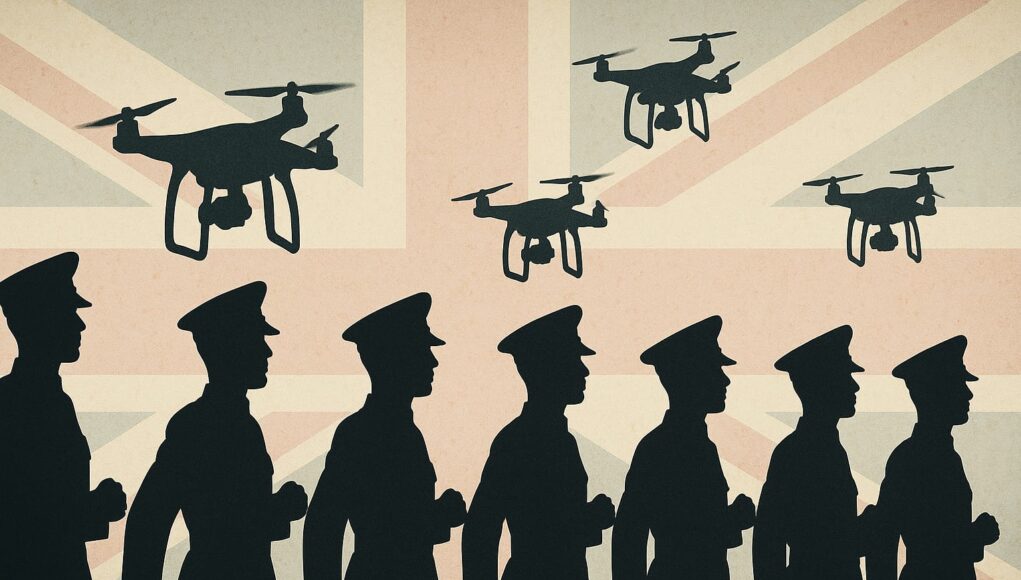



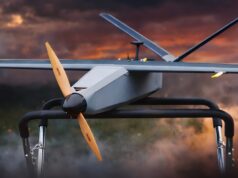
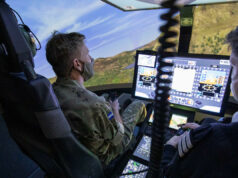
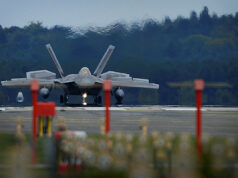
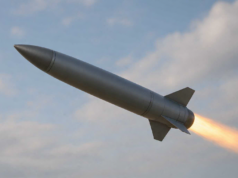




Air Cadets is dull. They barely fly any more, most of the glider fleet is gone and the AEF offering is a shadow of the past. But let’s solve it by letting them fly over glorified model aircraft.
You want to increase participation buy some actual aircraft and gliders and offer something that most teenagers and their families cannot possibly afford to do themselves.
The reason might be that flying drones is the future and being actually in the aircraft is the past (for the most part).
It was fun whilst it lasted but it is now on the way out.
No point in pretending otherwise.
I think the demise of the crewed aircraft, much like the tank is very over stated. Particularly in the world of transport and helicopters. Yes there will be more UCAV, but aircrew aren’t going anywhere and the RAF is also not the only destination of air cadets. If you want a good supply of airline pilots (that aren’t just from wealthy families), engineers etc you need to inspire and give opportunity for real air experience. Kids have flown drones without any government assistance for years. Not exactly inspiring.
It is the cheap easy alternative to reinvigorating the glider and AEF fleets. Pop down to Toymaster and pick up some drones, cheaper than a grob and an RAF flight instructor.
One of the other reasons is to give a flying qualification for cadets who are medically unable to fly themselves.
There are a whole host of conditions that can stop people doing AEF or gliding, but still allow them to enjoy drone flying.
I bought a drone a few years ago, was pretty rubbish at it, kept crashing.
Probably not going to get my wings !
Nor me, I’m afraid.
The badge still hasn’t been issued!
Blimey, that takes me back to Cubs, we used to get badges for doing stuff like tying knots and lighting fires !
“Dib dib dib”
Oh I’m not against them doing drone flying but let’s face it, this is a cheap way of trying to illicit excitement in teens by people who know next to nothing about teens. Drone flying is what middle aged men do while making YouTube content about niche hobbies.
Drone flying was very popular.
Safety briefings for drone flying, on the other hand…
*Drone flying is what middle aged men do while making Youtube content about niche hobbies*.
That’s a very specific profiling catagoriy you have stated there.
To be more realistic though. I see all sorts of Drone material on various media uploaded by various ages and genders. Drone photography has “Taken off” hugely these past few years, not always welcome by some due to it’s perceived intrusions of privacy.
It’s also been a natural evolution for those of us who grew up with remote control vehicles, boats and aeroplanes.
Worth noting that the Army has introduced Drone racing teams for inter unit competition, and a few units have invested in FPV simulators, I don’t think it’s just “because it’s cheap engagement.”
No I mean they are grasping at it and making a big thing of it because it is cheaper than replacing the real gliders and real aircraft that they used to fly teens in. Would a 15 year old rather be strapped into an actual aircraft and fly next to an actual RAF pilot or be taught how to fly a drone? They should do both, but the real aircraft experience is the draw, no getting away from that. As an air cadet walking across a live dispersal carrying a parachute, getting strapped into a Chipmunk and being taught airmanship and aerobatics by an RAF QFI, incredible experience. Flying a drone sounds positively dull and uninspiring by comparison. You inspire by offering the extraordinary, not by offering the every day. But such is the beige vanilla world we now inhabit.
So completely ignoring the point I raised about the fact that Drone operations is important to the armed forces and a skill they actively are seeking to foster. Got it.
Your anecdote sounds like you went AEF flying once, is that right?
I’ve been on AEF twice in three years, plus gliding yesterday plus tens of hours of simulator flying, which is one of the huge improvements over past years for the cadets.
Dern. Sorry no reply button under your comment. No I said they should do drones. Read my reply rather than cherry pick. What I am pointing out is that this is clearly an attempt to do something “cool” because the RAF and MoD run the AEF and gliding force into the ground.
TorpedoJ same, ne reply under your comment.
AEF once?! I was a cadet back in the 90s. I used to go on AEF 6 times a year and gliding eventually every single weekend I was free. We used to go shooting at an RAF station monthly. We went on camps to Germany and Cyprus and Gibraltar and used get last minute flights in hercs and domines etc. Cadets was over subscribed and had a waiting list to join because it was extraordinary. Lived on a council estate, went to a comp Monday to Friday. Flew in RAF aircraft more weekends than I didn’t. We also flew RC planes aka drones, that was considered one of the more dull activities.
Maybe take your own advice and pay attention to what I said, not what you wish I’d said.
I pointed out that drones are a military skill that the armed forces are trying to nuture and that it”s introduction is due to that, not as a cheap cop out, nor that it’s being done because it’s cool.
I for one agree.
There are so many aspects to modern warfare that ignoring a chance to engage a skill set like drone operation would be foolish.
“Some shoulder a weapon and slog, others pound a typewriter and organize”. Be it flying a Typhoon, driving a C3, using a joystick to hunt the enemy or ensure the logistics are in place, we all contribute to safety for all, security of the realm and peace of mind.
Incidentally, if anybody remembers, I apologized for my overreaction to the Canadian Hillbillies comment a while ago but things had moved on. I missed Halfwit so I have returned, Halfwit rocks!
Canadian Hillbillies?
I think I must have missed that episode.
Halfwit rocks, lol, my life is now complete !
As it should be! Thanks for the humour.
What Humour ? I’ll have you know I’m deadly serious at all times.😁
In my opinion this sounds like a wonderful idea. When I was allowed to “play” with a drone at aged 60ish it brought back my childhood dreams and lifted my idea of what can be done so much that I wrote to my son who had just joined the USMC and told him to get on this bandwagon!
Great stuff. Once this is sorted, can HMG do the same for the Army?
It sounds like the type of skill which will be required in all the services.
Only a small percentage of cadets go on to join the military, I still think it’s a worthwhile investment.
They look like Male Drones in the article picture, just saying.🍒🍒
We really shouldn’t be speculating on gender at this point!
#Day1
True, It’s a difficult subject to *Tackle*.
# what have I missed ?
Not much, only the usual — grown men politely telling each other to ‘Foxtrot Oscar.’
#Day1
I was looking for this article!
Earlier today I was one of the group of cadets addressed by Mr Cairns when he announced the increases, and I was actually one of the first cadets (4th or 5th) to fly drones under the new syllabus.
Waiting for the Red Arrows to come over at Syerston now!
Good for you mate!
Today’s teenagers would love to play with drones, so that is a good draw into the cadets. However, is the Ukraine conflict distorting the value of drones on a battlefield? Hardcore electronic warfare/microwave/laser systems may knock all/most of these drones out of the sky. Both sides in Ukraine have modified drones already to be guided by a long thin fibre rather than radio.
I heard the Irish are looking at manned Drones.
Are you volunteering?
For a small fee, I suppose i could be tempted. How hard do I have to flap my arms ?
There are other possible means of propulsion, drink beer/eat chilli…
Ahh, that sort of Wind assisted propulsion is not to be sniffed at.
Yes and no. It depends who you listen too. If you’re take is from watching a lot of TikTok and Twitter Videos you might come away thinking that Drones are the be all and end all and you can get away with nothing but because they’re so amazing, forgetting that you’re watching propaganda. On the other hand it’s also possible to swing too far the other way.
Drones are valuable force multipliers. But if the force you are multiplying is 0 then…. you get zero.
I hope Babcock gets the contract.
This seems to be one of the most common-sense ideas I’ve seen in a long time
Drones are here to stay, and we need to be reorganising to use them
And getting the cadet forces involved is a good step in the right direction
Agreed. A large part of the appeal of the ATC was indeed, flying, shooting and being pursued by officer cadets in Landrovers in the dead of night. Especially when you got one over on them. Nowadays it seems to be wooden guns, toy aeroplanes and zero danger. I don’t see them reaching their target, frankly.
I have both shot rifles and flown during cadets.
Today and yesterday I’ve had my ears nearly blown out by fast jet noise (F15s on afterburner are loud, btw, as are Typhoons in formation) so H&S isn’t everywhere.
The main part of the increase is spreading CCF into more state schools, which is effectively compulsory and can only be a good thing really.
Thanks for this. The “back in my day” and “everything is shit now” brigade need to be corrected from time to time. Not a cadet, and never have been (indeed have historically been skeptical of them), but the idea that they don’t let you shoot is rubbish.
Good, how often? Look in your 3822 and tell us. I’ll bet its a fraction of what we did. I see cadets running round with wooden guns, berets worn like their a chef. You know what I mean as well. I’m not criticising you personally, however government after government has made it increasingly difficult for youngsters to get the life skills they need. Through cuts and restrictions. This ‘expansion’ will do little. It will add disinterested school children to a list, many who cannot even afford ten quid towards a uniform. They will be told, it will count in someway when they are at school. My other half is a teacher and seen it first hand. Flying drones is no substitute for flying. Which was the original point of the OP. Oh and ‘Dern’, sometimes, not always, it was done better back then.
Not sure why my name is in quotes or why youre too cowardly to reply to me directly. But seems pretty clear youre the exact kind of wingey dinosaur that I was describing.
You’ve just had someone with first hand experience correct you and you’re dismissing them. Says it all really.
Amusing. You make inferences where none exist and your toys go out of the pram because I disagree. Oh well.
No inferences, just observing your behaviour. Also just going to point out that you threw a hissy fit because I complimented another posters response. Glass houses and stones and all that ‘Dragonwight’.
I’m CCF so I can’t speak for the cadets as a whole.
But our Army section shoots every third week on the range and are doing weapon handling most of the rest of the time. Live fire exercises twice a year. Their berets are shocking but that’s cos they’re Army, what do you expect? Never seen a wooden gun, it’s all L98s.
In state school CCF uniforms are provided, even at my private school they are lent out and handed back again when cadets leave the section. When staff and NCOs can motivate cadets it all goes smoothly, bad NCOs can ruin a squadron inside a year. Never heard anything about it helping at school, people do cadets for fun and for the experience.
Flying drones is absolutely a substitute for those cadets who are unable to go flying for medical reasons. For everyone else it’s an extra bit of fun and a CAA qualification that might come in handy later.
Cadets used to die doing stupid stuff, maybe it’s gone too far but a bit of discipline isn’t always wasted.
“I see cadets running round with wooden guns, berets worn like their a chef”
I’m all for banter but the RAF Regt have their uses.
TJ, do they let you near pistols? I see Glock make a .22lr training pistol called the 44.
Heavens, no!
Pistols are too easy and too tempting to point away from downrange and much harder to keep an eye on for the instructors.
Though we did once spend a fun half hour playing with decommissioned Glocks in the Odiham armoury.
A long time ago in a galaxy far far away, I had a Walther P38 in .22lr when I was 17 going on 18. Handed it in 28 years ago & still miss it from time to time.
Where’s George’s next intern coning from, I wonder?
Flying in Chipmunks, (including having a go at flying it) and Bristol Bulldogs. Gliding in Sedbergh’s and some other tandem thing, firing rifles, adventure training, camping, orienteering… ‘here’s’ a map, be there (miles away) at this time, now off you go.
Summer camp at a working RAF base (Turn Hill, Waddington, Wittering) that was what attracted us in the early 70’s to go join the Air Cadets.
We flew drones too… well airfix model kits out of windows (sometimes on fire). We’d sod about on the river in RAF Life rafts, 8 man, 12 man. It was great, it was a riot, and none of us died.
God alone knows how much of those kinds of activities are ‘banned’ now. Halcyon days.
AEF still going (though Chipmunks are museum/airshow pieces now)
Went gliding on Monday
Rifle shooting every few weeks
Orienteering twice a year
On a summer camp right now
The Navy do river rafting, we don’t have time but I did on a summer camp
Nothing much has changed.
Cool beans… it’s great that those things are still going on.
This is encouraging news. Think Lithuania is leading the way on this with their young people. Could see uk having drone reservists in the future. Drone asymmetrical warfare has lowered the bar for countries to cause ongoing mischief and will part of future conflicts.
Better funding is to be welcomed, but I suspect they have a wider problem to address.
Way back in 1978, my air cadet squadron was one of the best in the country, winning the Lees Trophy. We had 130-odd cadets, plus a GVC unit attached with 30 or so members. Fast forward to the 2010s and I bumped into a couple of cadets on a tram in Sheffield, discussing principles of flight, which I duly helped them with. Membership of the now combined unit was 32!
I’d guess it’s a similar story across the country, and symptomatic of the problems the armed forces have in attracting recruits (other than badly managed recruitment agencies for a start), there’s a disconnect between the far too much of the population and the forces, let alone a generation of suitable recruits unwilling to potentially put their life on the line for the country they live in. It’s sad.
I think it’s time to change their motto from ‘Venture Adventure’ to something more appropriate.
Few flying and gliding places, few camp places, lots of red tape to do anything mildly adventurous. Too much focus on badges these days too.
Firstly the Image shown on this Story Dose not Show a True representation of the Air Cadets or Royal Air Force Air Cadets Or The Air Training Corps for that matter I find it Extremely distasteful and Nor does it show that Respect to those who have Given Service to the Organisation for Many Years for a Service of good For 84 years serving the Community and let’s not forget the Purpose it was Formed to Show this Made up Image of silhouettes supposedly Of Young Cadets In Uniform that Dose not Resemble Anything the Cadets wear and may I add the Uniform they do Wear is with Pride and what it represents
We can only use images we have access to.
I can see that but again it’s not a Very Good representation too the Story
Did ChatGPT write that for you?
No it Didn’t thank you
Ah, too bad, I was giving you the benefit of the doubt:
Learn to use correct capitalisation and punctuation.
Your a Keyboard warrior and thank you for Pointing that out but I don’t see it Being the End of The World My incorrect punctuation My Point was very much in saying About the Image used didn’t represent a Organisation for Good that Offers Great opportunities for The Youth of Today that’s regularly available and accessible Dern Pop Down to your Local Sqn and Offer your Services to volunteer there always looking for New Staff
Yeah sorry, not going to bother to read that punctuation-less mess. Learn to type, then we can talk.
But rich of someone who can’t write a coherent paragraph to criticise a header.
Wouldn’t mind some extra volunteers in the section, to be fair! Would take pressure off the OC.
Are you free on a Monday afternoon by any chance?
I do enough soldiering in my job thanks, and even if I didn’t, I really don’t like Cadet Instructors, and don’t really want anything to do with them (no offence intended to the cadets themselves). Thanks for the offer though.
No problem, wasn’t being really serious.
So Army and Air cadets, what about sea cadets as 44 yrs ago what I managed to learn and do went a long way to a naval career both RN and MN and I’m finishing as a senior Master?
Sea Cadets have no govt funding, so the minister has no power to change their numbers.
Thanks I was not aware of that. Maybe they need some funding?
It’s quite a longstanding arrangement I think so unlikely to change soon.
BTW I assume MN is Merchant Navy rather than Marine Nationale?
Yep